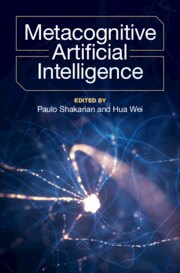Book contents
- Frontmatter
- Contents
- Contributors
- Acknowledgments
- Part I Introduction
- Part II Taxonomy of Metacognitive Approaches
- Part III Neuro-Symbolic Models in AI
- Part IV Metacognition with LLMS
- Part V Metacognition in Learning Agents
- Part VI Assured Machine Learning in High-Stakes Domains
- Part VII Metacognition as a Solution to Handle Failure
- Part VIII Applications of Metacognitive AI
- 15 Robust and Compositional Concept Grounding for Image Generative AI
- 16 mLINK: Machine Learning Integration with Network and Knowledge
17 - Military Applications of Artificial Intelligence Metacognition
from Part VIII - Applications of Metacognitive AI
Published online by Cambridge University Press: 08 September 2025
- Frontmatter
- Contents
- Contributors
- Acknowledgments
- Part I Introduction
- Part II Taxonomy of Metacognitive Approaches
- Part III Neuro-Symbolic Models in AI
- Part IV Metacognition with LLMS
- Part V Metacognition in Learning Agents
- Part VI Assured Machine Learning in High-Stakes Domains
- Part VII Metacognition as a Solution to Handle Failure
- Part VIII Applications of Metacognitive AI
- 15 Robust and Compositional Concept Grounding for Image Generative AI
- 16 mLINK: Machine Learning Integration with Network and Knowledge
Summary
AI is evolving rapidly and is poised to have far-reaching societal and global impacts, including in the military domain. AI offers cognitive reasoning and learning about problem domains –processing large quantities of data to develop situational awareness, generate solution goals, recommend courses of action, and provide robotic systems with the means for sense-making, guidance, actions, and autonomy. This chapter explores metacognition – an emerging and revolutionary technology that is enabling AI to become self-aware – to think and reason about its own cognition. This chapter explores metacognition applications in the military domain, focusing on four areas: (1) improving human interaction with AI systems, (2) providing safe and ethical AI behavior, (3) enabling autonomous systems, and (4) improving automated decision aids. The chapter begins with an overview of foundational AI and metacognition concepts, followed by a discussion of the potential contribution of metacognition to improve military operations. The chapter concludes with speculations concerning the more distant future of metacognition and its implications on AI systems and warfare.
Information
- Type
- Chapter
- Information
- Metacognitive Artificial Intelligence , pp. 276 - 296Publisher: Cambridge University PressPrint publication year: 2025
